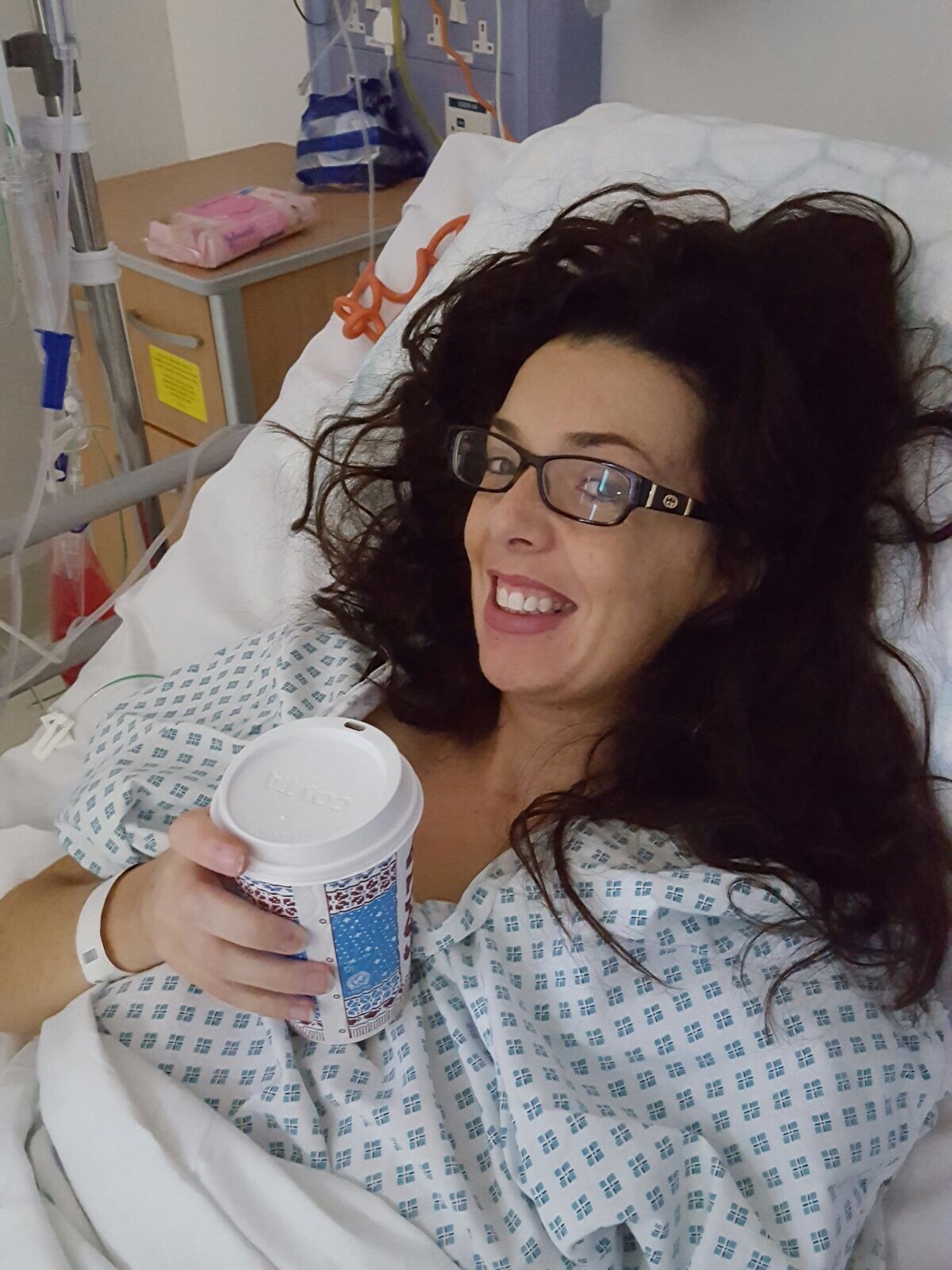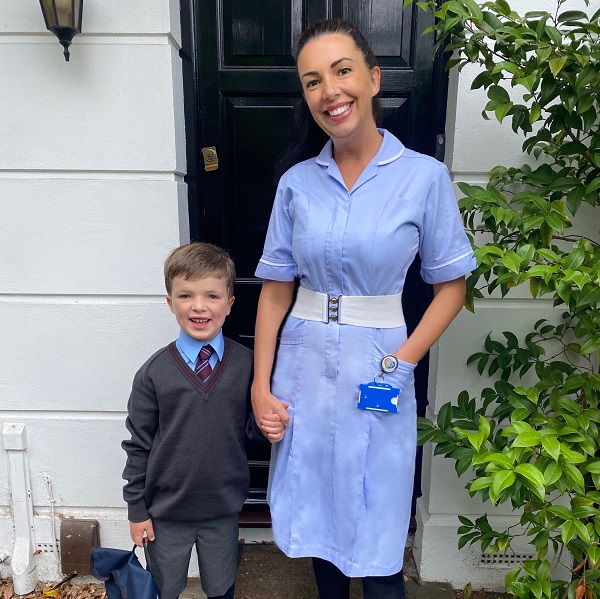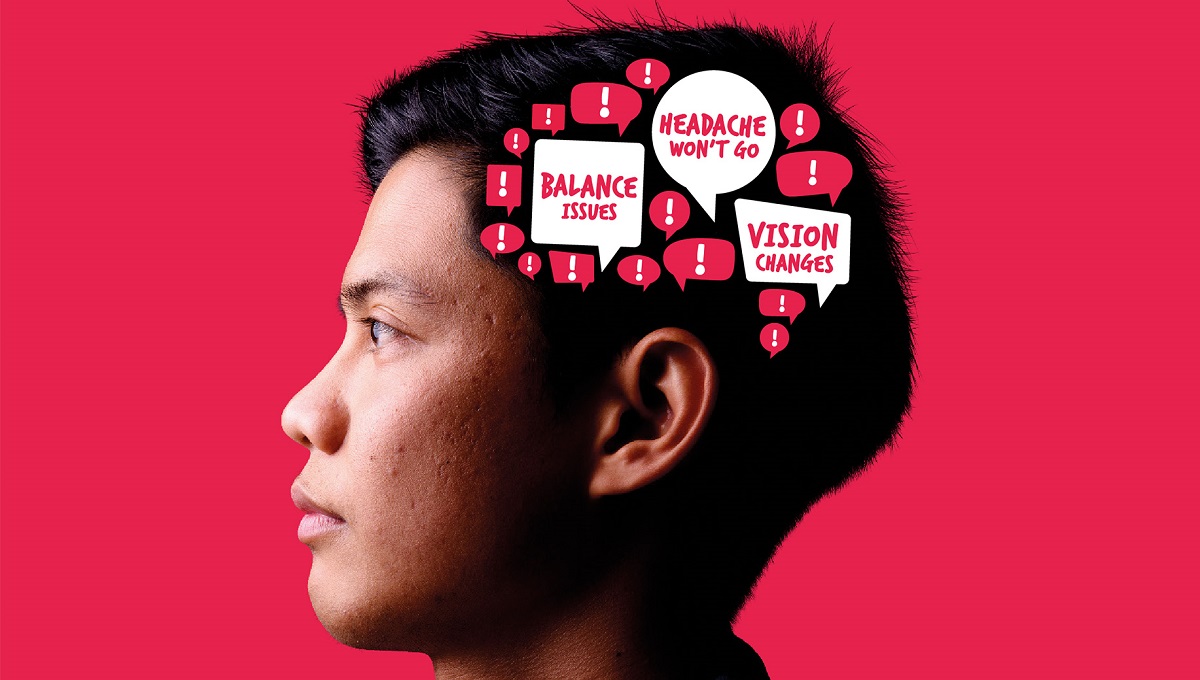From being personally affected by a brain tumour to helping others who are affected, Katie Baker’s story is an incredible one. In this post we’ll look at:
- Kate’s brain tumour diagnosis
- Becoming a neuro critical care nurse
- Knowing the signs and symptoms of brain tumours
- Better Safe Than Tumour
Kate’s story: from diagnosis to neuro nurse

Kate first became unwell in 2016 with persistent headaches, nausea and dizziness which progressively got worse. By December, she was regularly projectile vomiting and collapsing. As a healthy 35-year-old woman, she knew something wasn’t right. But every trip to her local GP in Essex ended with antibiotics for a sinus infection.
Kate said: “(GPs have) only got one job and that is to look after you. And I know they’re under a lot of pressure but so are we. Everyone’s under a lot of pressure in the NHS at the moment but that does not excuse using someone’s age against them.”
The week before Christmas, Kate decided to stay at her parents’ house because she was so unwell. Her son was with his dad for the holidays and she wanted to concentrate on getting better. One night, Kate almost fell down the stairs but was luckily saved by her sister-in-law. It was her brother who decided enough was enough and drove her straight to A&E. While they waited to see the doctor, Kate collapsed again. This prompted the NHS staff on duty to do a CT scan, which revealed a mass at the back of her head.
Directly after this brain tumour diagnosis, Kate was rushed to Queens Hospital for emergency neurosurgery the next day: “If I hadn’t got there when I did, I wouldn’t be here now.”
Most of Kate’s tumour was removed during the surgery and she was able to go home on Christmas Eve to be with her son for the holidays. She soon returned to work and became an avid supporter of both the hospital and The Brain Tumour Charity. In 2019, Kate completed the Sahara Trek as a way to say thank you to the hospital staff who had helped her at a time she’d been at her lowest.
All I wanted to do is just say thank you to the wonderful team on Sahara B ward, and tell them that this is how amazing that they actually are that I am prepared to go and walk 100 miles around the Sahara – actually, because of you guys, I can do this.
Kate Baker
Becoming a neuro critical care nurse

Inspired by the staff that helped during her own brain tumour diagnosis, Kate started volunteering at Queens Hospital so she could make a difference for others in similar situations. She became the Patient Partner on the council and worked tirelessly to ensure patients received paramount care.
Kate said: I wasn’t meant to be blue lighted to Queens to nearly die. I was delivered here safely to be a nurse.“
During the pandemic, things changed. Kate was furloughed from her day job and wasn’t allowed to continue her volunteering at the hospital. But she could see that there were other opportunities to help patients and support those that needed care. So, with a leap of faith, she applied and soon started a new job as a healthcare assistant: “I can’t remember the defining moment, but I knew it was everything I ever wanted to do.“
Kate knew she’d found her calling and hasn’t looked back since. Even though the days can be tough and she knows her brain tumour diagnosis could one day impact her ability to help the patients she cares for, Kate knows that becoming a nurse has made her stronger than ever and given her a newfound zest for all life has to offer: “I just kind of wish I’d seen the signs earlier that nursing was what I should be doing and what I love doing.“
Treatment and knowing the signs and symptoms
In December, Kate learned that her tumour had grown back once again, this time as a low-grade tumour. She had to decide whether to undergo neuro surgery for a second time or put her name forward for Gamma Knife Surgery. Not wanting to relive her emergency operation six years earlier, she opted for the latter and began her treatment in January 2023.
Kate said: “Whilst it’s not quite as catastrophic as it was the first time, still emotionally hard to deal with this thing in your head.“
Although a drastically different situation to the first time around, the regrowth of her tumour has still taken its emotional toll on Kate and her family and brought back traumatic memories. This time, Kate’s treatment has given her the opportunity to reflect on how emotionally and physically overwhelming her experiences have been. Fortunately, alongside the staff at Queens Hospital, The Brain Tumour Charity’s support team has helped her through this difficult time.
“I want people to continue to check their symptoms. I want advances in treatments available to people, less invasive where possible
Looking back at the neuro nurse that I now am to the 35 year old woman who’s struggling with her health, I’d say ‘Go and demand answers and look them in the eye and say if this was you or a member of your family would you still send me away with antibiotics for somethings that clearly not a sinus infection.“
Kate Baker
Better Safe Than Tumour
Now armed with the knowledge of a neuro nurse and her own experiences as a brain tumour patient, Kate wishes she had demanded more answers when she first went to the GP in 2016. As an active 35-year-old woman, Kate felt she was pushed aside multiple times. She was told that because of her age and fitness, there was no way something could be seriously wrong when in reality, nothing could be further from the truth. Brain tumours can strike anyone of any age.
Visit our Better Safe Than Tumour website to learn more about how to spot the signs of a brain tumour. If you or a loved one displays two or more symptoms, visit your GP. You can prepare for your appointment with the helpful guide for how to speak to your GP on our Better Safe Than Tumour website, or by speaking to our support team.
If you would like to talk about any of the topics raised in this post, our support team are available 9-5 Monday to Friday by calling 0808 800 0004 or emailing support@thebraintumourcharity.org.

